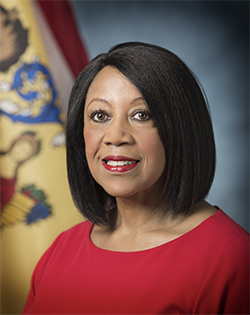The New Jersey Department of Community Affairs (DCA) was created in 1967 to bridge the growing divide between state government and New Jersey’s municipalities.
According to Lt. Governor Sheila Oliver, who also serves as DCA commissioner, “Municipalities were struggling and going through a transition period, so DCA was created to serve as a liaison-type of agency. Since that time, the objective of the department has always been to make certain we improve the quality of life for people in our state.”
At this morning’s virtual Town Hall Meeting sponsored by the New Jersey Business & Industry Association and the State Chamber of Commerce, Oliver gave concrete examples of how DCA sprung into action to preserve the quality of life of thousands of residents, small businesses and municipalities that experienced financial hardships during the COVID-19 pandemic.
With an estimate that there could be some 178,000 eviction notice filings before the pandemic is over, Oliver said the DCA is utilizing various streams of federal and state funding to provide financial support to tenants who have accumulated rental arrearages.
In July, for example, the DCA created the COVID-19 Emergency Rental Assistance Program that provided financial relief to 15,000 families with initial funding. “Subsequently, we were able to identify additional money to help another 7,000 families,” Oliver said.
These programs are also helping landlords who have property tax and utility bills to pay, she said.
Additionally, direct aid to landlords who own retail and other commercial properties is being made available through an assistance program overseen by the New Jersey Redevelopment Authority, an affiliate of the DCA.
To help municipalities, the department introduced the COVID-19 Revitalization Program last year, which expands the Main Street New Jersey Program; the Neighborhood Preservation Program; and the Neighborhood Revitalization Tax Credit Program.
Oliver sees a resurgence in local small businesses because of the pandemic, but she warms, “Let’s continue to promote small businesses and not fall into old habits,” alluding to the possibility of people returning to large shopping malls.
With the rise in COVID-19 cases these past few days, Oliver said that Gov. Phil Murphy is not prepared to move any further than he already has in fully reopening the state.
She is not sure how the summer tourism season will be and commented: “Shore businesses took a hit last year, and many – if they take another significant hit this year – are not going to survive. So, let’s do what we did from the very beginning; let’s continue social distancing, mask wearing and observing all the protocols that are in place. Together, with vaccinating our population, we will be able to broaden and open businesses that much further.”
When asked how the $6 billion the state is receiving from the American Rescue Plan (in addition to CARES Act money that has not been spent) will be used to support businesses, Oliver said she is “waiting with bated breath for the federal government to pass down regulations [on how to use the funds]. We don’t know yet what will be allowable or what will be disallowed. What is great is that we are going to be able to weigh in with the federal administration on things that would be appropriate and useful [to us].”


